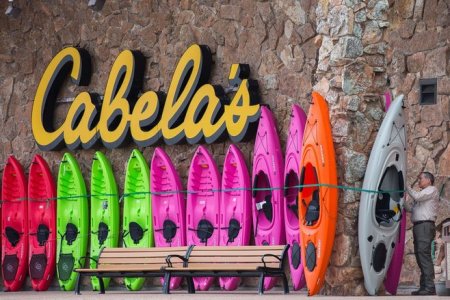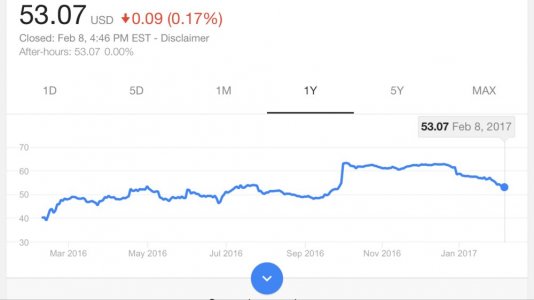Skibbys bottom
Established Member
Just thought I'd let you know what's happening to Cabela's after the buy out by Bass Pro Shop. Enclosed is an article from the Omaha World Herald in which is says what's going to happen. I'm enclosing the full article so this will be rather lengthy.
Glad I traded in my Cabela's points

Top of Form
Bass Pro's purchase of Cabela's: Catching you up on why it happened and what's next
· By Brad Davis / World-Herald Business Editor
· Oct 4, 2016 (3)

There are questions and answers after Bass Pro Shops announced its $5.5 billion purchase of Cabela’s on Monday. The biggest question: What happens to the 2,000 workers at Cabela’s headquarters in Sidney, Nebraska, a town of 6,800 about six hours west of Omaha? What we do know: Nebraska is losing another biggie — this time a member of the Fortune 1000 list of the U.S.’ biggest companies. Cabela’s clocked in at No. 592. Now it joins ConAgra Foods — No. 176 — on an exodus from Nebraska after Missouri-based Bass Pro snapped up the outdoors retailer.
Here’s what else is on our minds:
Q: So, what happens to Cabela's retail stores?
Some probably will close, especially in areas where Bass Pro already operates its own stores. In the Omaha area, that could mean either the Bass Pro in Council Bluffs or the Cabela’s in La Vista could shut. None of these changes will happen anytime soon, though. The deal doesn’t close until the first half of next year, and even then, changes at the retail store level probably won’t happen immediately. Bass Pro management in Springfield, Missouri, will want to look at the books and see what makes sense.
Q: Does the Cabela's name go away?
No. But what form it takes is unclear. Will it still adorn retail stores around the country? Or will it just be a brand sold within Bass Pro Shops? Bass Pro Chief Executive Johnny Morris said only that “Bass Pro Shops has every intention of celebrating and growing the Cabela’s brand.” No word on what that means, specifically.
Q: Why did this have to happen?
Cabela’s for years had been struggling with poor “same-store sales.” That’s retail lingo for sales rung up at stores that have been open for more than a year versus sales at the same stores the previous year. It also expanded quickly after issuing stock to the public in 2004. Some Wall Street types say it expanded too quickly, opening stores too close to each other that cannibalized off of each other. That type of performance attracted the attention of Elliott Management, an activist investor. Activist investors — which used to be called “vulture funds” back in the 1980s — swoop in when they smell blood, buying up big stakes in companies and then pressing for big changes. Elliott announced its big stake last October. The fund probably wasn’t going to go away unless it got some kind of change that goosed the value of its stock holdings. It got that change Monday. It paid around $38 a share for its common stock, Dow Jones reported. Bass is buying Cabela’s for $65.50 a share.
Q. What about Sidney?
That’s the toughest question for Nebraskans. The Panhandle city is the definition of a “company town.” Usually when a company acquires another — as Bass is doing with Cabela’s — the acquiring company closes shop of the acquired. Cabela’s headquarters, then, might be done for. What Bass Pro leaves behind in Sidney, on the other hand, is another question. Bass says it “intends to continue to maintain important bases of operations” in Sidney and in Lincoln, where the company has more than 500 employees who work for its credit-card division. But Wall Street watchers say the entire reason for a tie-up like this is to cut costs when it comes to duplication. (There’s no reason to have two marketing departments, two IT departments and so on.) That means there are likely to be substantial job cuts in Sidney — but just how many we probably won’t know until next year, after the deal closes. Until then, it’s a sad waiting game in Sidney.
Q: Wait, doesn't this all sound familiar?
You can be forgiven if you have the feeling that Nebraska just went through something similar. Hometown packaged-food giant ConAgra Foods, which had been based in Omaha since 1922, itself became the target of an activist investor last year. That activist, Jana Partners, also said it wanted to see big changes at ConAgra, which, like Cabela’s, had been seen as an underperformer in its sector. The end result: big job cuts in Omaha and the departure of the company’s headquarters to Chicago. (It still employs 1,200 office workers here.) “I doubt it’s anything in the water in Nebraska,” Jay Lorsch, a Harvard Business School professor told us last year when we asked him whether Nebraskans should be worried that two of their corporate crown jewels had been targeted by two different activists. Still, you have to wonder.
Glad I traded in my Cabela's points

Top of Form
Bass Pro's purchase of Cabela's: Catching you up on why it happened and what's next
· By Brad Davis / World-Herald Business Editor
· Oct 4, 2016 (3)

There are questions and answers after Bass Pro Shops announced its $5.5 billion purchase of Cabela’s on Monday. The biggest question: What happens to the 2,000 workers at Cabela’s headquarters in Sidney, Nebraska, a town of 6,800 about six hours west of Omaha? What we do know: Nebraska is losing another biggie — this time a member of the Fortune 1000 list of the U.S.’ biggest companies. Cabela’s clocked in at No. 592. Now it joins ConAgra Foods — No. 176 — on an exodus from Nebraska after Missouri-based Bass Pro snapped up the outdoors retailer.
Here’s what else is on our minds:
Q: So, what happens to Cabela's retail stores?
Some probably will close, especially in areas where Bass Pro already operates its own stores. In the Omaha area, that could mean either the Bass Pro in Council Bluffs or the Cabela’s in La Vista could shut. None of these changes will happen anytime soon, though. The deal doesn’t close until the first half of next year, and even then, changes at the retail store level probably won’t happen immediately. Bass Pro management in Springfield, Missouri, will want to look at the books and see what makes sense.
Q: Does the Cabela's name go away?
No. But what form it takes is unclear. Will it still adorn retail stores around the country? Or will it just be a brand sold within Bass Pro Shops? Bass Pro Chief Executive Johnny Morris said only that “Bass Pro Shops has every intention of celebrating and growing the Cabela’s brand.” No word on what that means, specifically.
Q: Why did this have to happen?
Cabela’s for years had been struggling with poor “same-store sales.” That’s retail lingo for sales rung up at stores that have been open for more than a year versus sales at the same stores the previous year. It also expanded quickly after issuing stock to the public in 2004. Some Wall Street types say it expanded too quickly, opening stores too close to each other that cannibalized off of each other. That type of performance attracted the attention of Elliott Management, an activist investor. Activist investors — which used to be called “vulture funds” back in the 1980s — swoop in when they smell blood, buying up big stakes in companies and then pressing for big changes. Elliott announced its big stake last October. The fund probably wasn’t going to go away unless it got some kind of change that goosed the value of its stock holdings. It got that change Monday. It paid around $38 a share for its common stock, Dow Jones reported. Bass is buying Cabela’s for $65.50 a share.
Q. What about Sidney?
That’s the toughest question for Nebraskans. The Panhandle city is the definition of a “company town.” Usually when a company acquires another — as Bass is doing with Cabela’s — the acquiring company closes shop of the acquired. Cabela’s headquarters, then, might be done for. What Bass Pro leaves behind in Sidney, on the other hand, is another question. Bass says it “intends to continue to maintain important bases of operations” in Sidney and in Lincoln, where the company has more than 500 employees who work for its credit-card division. But Wall Street watchers say the entire reason for a tie-up like this is to cut costs when it comes to duplication. (There’s no reason to have two marketing departments, two IT departments and so on.) That means there are likely to be substantial job cuts in Sidney — but just how many we probably won’t know until next year, after the deal closes. Until then, it’s a sad waiting game in Sidney.
Q: Wait, doesn't this all sound familiar?
You can be forgiven if you have the feeling that Nebraska just went through something similar. Hometown packaged-food giant ConAgra Foods, which had been based in Omaha since 1922, itself became the target of an activist investor last year. That activist, Jana Partners, also said it wanted to see big changes at ConAgra, which, like Cabela’s, had been seen as an underperformer in its sector. The end result: big job cuts in Omaha and the departure of the company’s headquarters to Chicago. (It still employs 1,200 office workers here.) “I doubt it’s anything in the water in Nebraska,” Jay Lorsch, a Harvard Business School professor told us last year when we asked him whether Nebraskans should be worried that two of their corporate crown jewels had been targeted by two different activists. Still, you have to wonder.

